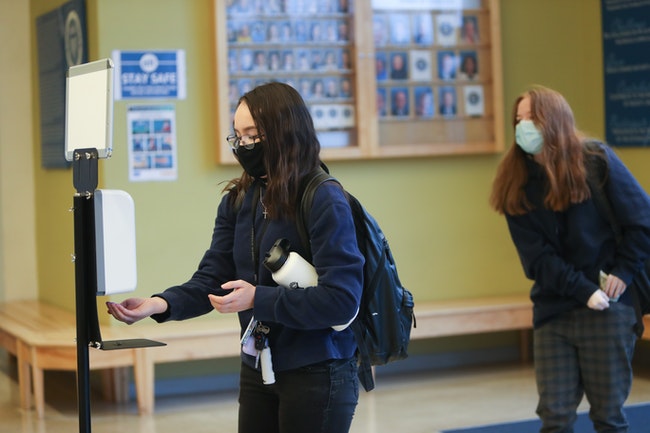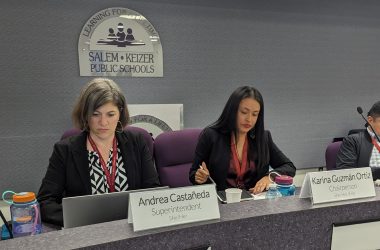
A student sanitizes her hands upon entering Blanchet Catholic School on Thursday, Jan. 28, 2021. (Amanda Loman/Salem Reporter)
Covid will soon be just another disease in Oregon’s schools.
Starting March 12, students won’t be required to quarantine if they’re exposed to the virus, unless they get sick or test positive.
State health and education officials are also recommending schools stop all contact tracing, the practice of determining who someone with the virus was near to stop the virus’ spread.
Colt Gill, director of the Oregon Department of Education, said the changes reflect the evolving reality of the pandemic, with higher levels of immunity and the greater transmissibility of the virus which renders contact tracing and subsequent quarantine ineffective.
“Covid-19 has evolved to become one of the most transmissible viruses known, and by the time exposure is identified and contact tracing is performed, transmission has oftentimes already occurred,” Gill said during a Wednesday news conference.
The changes announced Wednesday will take effect the day Oregon’s statewide mask mandate lifts — March 12.
Oregon health agencies will stop recommending quarantine and stop contact tracing for the general public on the same date.
Local schools or districts still have the option to enact mask mandates locally or impose more stringent Covid protocols, and any student or school employee may choose to wear a mask even when it’s not required.
Salem-Keizer School District leaders have not yet announced how the district will respond to the shifting guidelines or indicated whether they will seek to impose a local mask mandate.
Superintendent Christy Perry said she expects to make an announcement about masking by the end of the week. She and other district leaders are talking to local health care providers.
“We’ve seen the guidance, we’ve reviewed it carefully, we’ve met with some community health partners,” Perry told Salem Reporter Wednesday afternoon. “We are excited that the numbers are down and that we aren’t seeing the community spread.”
Dr. Dean Sidelinger, state epidemiologist, said contact tracing will continue in high-risk settings such as prisons, shelters and long-term care facilities where people live in close quarters.
“This can feel like it’s signaling the end of the pandemic and I want to be clear that’s not the intention here,” Gill said.
Rather, he said, the changes reflect a period of lower risk and a desire to allow Oregonians and local authorities to make decisions reflecting their own risk tolerance and local conditions.
Gill said that means shifting the onus for adapting to changing conditions onto county commissioners, who function as local boards of health, and local public health authorities.
Marion County leaders have expressed little interest in the county playing that role.
In response to a question from Salem Reporter about how the county’s health department would advise local schools in light of the changes, spokesman Jon Heyen said there would be no guidance given.
“Each school district in Marion County is unique, with different challenges they must address, and we believe decisions around new ODE/OHA COVID-19 guidelines should be made at the local level,” Heyen said in an email. “The Marion County Board of Commissioners and Marion County Health and Human Services Department will not be providing recommendations to local school districts on any new COVID-19 guidelines released by OHA or ODE.”
Once the changes take effect, Covid will generally be treated like any other communicable disease in Oregon schools.
That means parents should keep kids home for five days when they’re sick or test positive for the virus, Gill said.
The state education department is encouraging schools to issue broad notifications to students and school employees when someone in their classroom, school bus, sports team or other group at school tests positive for the virus.
That notification should include information about how to get tested for Covid, Gill said.
As with the flu or other communicable diseases, local public health authorities can still order schools to close temporarily if there’s a Covid outbreak or high incidence of illness, Sidelinger said.
Sidelinger said the changes also reflect an effort by state officials to keep Covid tests more available for those who need them most, such as medically fragile and immunocompromised students and school employees.
Instead of testing low-risk students broadly for the virus, he said it’s important tests are available to those at highest risk so they can promptly seek testing following an exposure to the virus.
“We feel that at a time where disease rates are coming down, this will not significantly increase risk in schools,” Sidelinger said.
Oregon will keep its requirement that all school employees and volunteers be vaccinated against Covid or seek religious or medical exemption, Sidelinger said. He said there are no plans to remove that rule.
“Covid has not gone away so having high levels of immunization in the staff and volunteers in schools is an important tool,” he said.
Contact reporter Rachel Alexander: [email protected] or 503-575-1241.
JUST THE FACTS, FOR SALEM – We report on your community with care and depth, fairness and accuracy. Get local news that matters to you. Subscribe to Salem Reporter starting at $5 a month. Click I want to subscribe!









